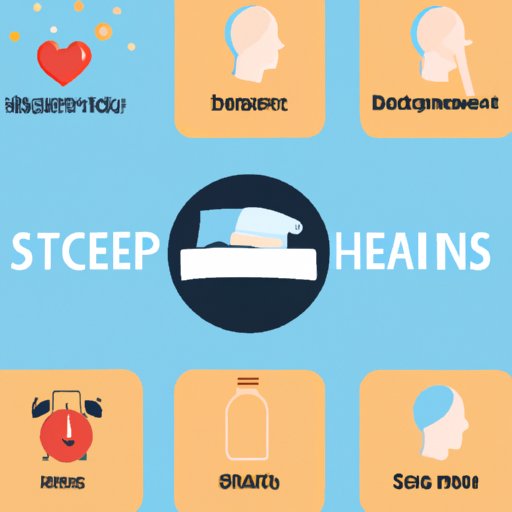Introduction
Mental health is an important part of our overall well-being. It’s defined as a state of emotional, psychological, and social balance in which we can cope with the challenges of everyday life. While there are many factors that contribute to mental health, one of the most important is sleep. Lack of sleep can have a profound effect on our mental health, leading to problems such as mood swings, anxiety, stress, and depression.
How Lack of Sleep Impacts Mood, Anxiety and Stress Levels
The quality of our sleep has a direct impact on our emotional and mental state. Poor sleep can lead to irritability, low energy, and difficulty concentrating. It can also heighten our sensitivity to stress and make us more prone to anxiety. Studies have found that people who don’t get enough sleep are more likely to experience negative emotions and mood swings than those who do get enough rest.
Sleep deprivation can also interfere with our ability to think clearly and make decisions. When we don’t get enough sleep, our cognitive performance is impaired, making it difficult to focus and process information. This can lead to poor decision-making and increased stress levels.

Examining the Relationship between Sleep Quality and Cognitive Performance
The quality of our sleep has a direct impact on our cognitive performance. Studies have found that even a few nights of poor sleep can lead to decreased alertness, reduced ability to concentrate, and reduced problem-solving skills. In addition, lack of sleep can lead to memory problems, difficulty learning new tasks, and slower reaction time.
Poor sleep can also lead to decreased creativity and decreased motivation. When we don’t get enough restful sleep, our bodies and minds become fatigued, making it difficult to stay focused and motivated. This can lead to feelings of apathy, which can further impair our ability to make decisions and take action.

Understanding the Impact of Sleep Disorders on Mental Health
Sleep disorders such as insomnia, sleep apnea, and restless leg syndrome can have a significant impact on our mental health. If left untreated, these conditions can lead to fatigue, low energy, and difficulty concentrating. In addition, they can cause mood swings, anxiety, and depression. People with sleep disorders are also at an increased risk of developing other mental health issues, such as substance abuse and post-traumatic stress disorder (PTSD).
Investigating the Link between Sleep and Depression
Depression is a serious mental health condition that can be caused or exacerbated by lack of sleep. Studies have found that people with depression are more likely to suffer from insomnia or other sleep disturbances. Poor sleep can worsen the symptoms of depression, making it harder to manage the condition. Conversely, when people with depression get better sleep, their symptoms tend to improve.
In addition, lack of sleep can increase the risk of developing depression. Studies have found that people who don’t get enough restful sleep are more likely to become depressed than those who do get enough rest. This is because not getting enough sleep can lead to a decrease in serotonin, a hormone that helps regulate mood. Low levels of serotonin can lead to feelings of sadness, hopelessness, and worthlessness.
Analyzing the Role of Sleep in Addiction Recovery
Sleep is an important factor in addiction recovery. People who struggle with substance abuse often suffer from insomnia or other sleep disturbances. Poor sleep can worsen the symptoms of addiction, making it harder to break free from the cycle of addiction. On the other hand, getting enough restful sleep can help people in recovery stay on track and stay sober.

Examining Possible Solutions to Improve Sleep Quality
If you’re struggling with sleep, there are some things you can do to improve your sleep quality. First, establish a regular sleep schedule and stick to it. Go to bed and wake up at the same time every day, even on weekends. Second, avoid stimulants like caffeine and nicotine close to bedtime. Third, create a relaxing bedtime routine to help you wind down before going to sleep.
In addition, limit your exposure to blue light from electronic devices like phones and computers in the hours before bedtime. Finally, if you’re struggling with insomnia or another sleep disorder, talk to your doctor about possible treatments. Medications and therapy can help you get the restful sleep you need to maintain good mental health.
Conclusion
Sleep is an essential part of maintaining good mental health. Poor sleep can lead to problems such as mood swings, anxiety, stress, and depression. It can also interfere with our ability to think clearly and make decisions. In addition, lack of sleep can increase the risk of developing depression and can worsen the symptoms of addiction. To improve your sleep quality and promote mental well-being, establish a regular sleep schedule, avoid stimulants, create a bedtime routine, limit your exposure to blue light, and seek treatment for sleep disorders.
(Note: Is this article not meeting your expectations? Do you have knowledge or insights to share? Unlock new opportunities and expand your reach by joining our authors team. Click Registration to join us and share your expertise with our readers.)
